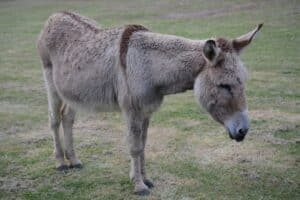Lessons We Need from Balaam and His Donkey
by Richard Blackford
It begins with Balak, the Moabite king, who was fearful of the Israelites moving through his territory on their way to the Promised Land. He sent for Balaam, a non-Israelite prophet and diviner, to bribe him to pronounce a curse on the Israelites.

Balaam was offered payment to curse Israel. Later, he was offered sheep, oxen, and high honor if he would do this.
Balaam's Idolatry
It doesn’t say he bowed to images, yet he was guilty of idolatry. He was determined to get the rewards Balak had offered and tried repeatedly, though God would only allow him to prophesy good, not evil. He was stubborn (“as a mule.” A mule is half donkey!). “Stubbornness is as… idolatry” (I Samuel 15:23).
Balaam was also covetous and was specifically noted for his greed for personal gain over his integrity (II Peter 2:15; Jude 11). Plainly, “covetousness, which is idolatry” (Colossians 3:5).
He was also guilty of pride, a form of self-idolatry, but was humbled by a donkey.
We’re also told that Balaam taught Balak to cast a stumbling block before Israel, to eat things sacrificed to idols, and to commit fornication (Revelation 2:14). This was called “the doctrine of Balaam.”
Irony
There’s plenty of irony in this story.
- Balaam’s anger got so out of control that he carried on an argument with a donkey and didn’t even realize the donkey was talking back to him! And she won the debate.
- And have you ever wondered why we’re told that the donkey was a “she?” Perhaps at a time when women were esteemed as less than men and more like property, Balaam needed humbling and was schooled by a donkey who also happened to be female.
- There is irony in that while Balaam wanted to kill his donkey, she was saving his life! Wow, does it get more ironic than this? Yes.
- Balaam’s donkey gave him a lesson in anger management! Balaam was so hot-headed that he beat her three different times when she balked at the sword-bearing angel. At that same time, Balaam tells the donkey that he wishes he had a sword so he could kill her. And the sword-bearing angel tells Balaam that if the donkey hadn’t turned away, he would have slain Balaam and saved the donkey. Whew!
- While the donkey spoke sensibly and solemn words to Balaam, he made a donkey of himself!
- It is said that “the Lord opened the mouth of the donkey” to speak and that “the Lord put a word in Balaam’s mouth.”
- The number “3” figures prominently. Three times, Balaam attempts to deliver the prophecy Balak desires. Three times, Balaam beat his donkey. Three times Balak offered a different site and animal sacrifices, thinking it would please Jehovah.
- Balaam said, “Let me die the death of the righteous” (Num 23:10). But you can’t die the death of the righteous if you have not lived the life of the righteous.
Back to the anger management lesson. Did you notice how kindly she speaks to Balaam? She made an impassioned plea about how long she had been tried and true, faithfully serving Balaam without incident, and when she behaved out of character, he should have known something unusual was up. She could have chewed him up and spit him out! But she did what Proverbs 15:1 says: “A soft answer turns away wrath: but grievous words stir up anger.” Peter said, “She restrained the madness of the prophet.” She could have called him a “dumb ass” for his asinine behavior, which would have stirred more anger, but that’s what she was called in II Peter 2:16 (KJV, ASV). It’s hard to say which is more humiliating: to be called that name or to have to admit that you had to learn a lesson that was taught to you by a dumb ass.
Although God would only allow Balaam to bless (not curse) Israel, there is an incidental lesson contained in the words Balaam told Balak that should be echoed by all preachers today. He said: “If Balak would give me his house full of silver and gold, I cannot go beyond the commandment of the Lord, to do either good or bad of mine own mind; but what the Lord saith, that will I speak.” He spoke similar words on more than one occasion.
Unglorious Death
Balaam made a poor choice by associating with evil men, from whom he coveted riches and honor. In his case, there was no profit in being a prophet, and his life ended without either gain or loss. He died in battle amidst God’s enemies, the Midianites, whom he had misused against Israel. And he was slain with the sword after all, by the Israelites (Numbers 31:8).
Lessons for Us?
Are we (you and me) idolaters? Stubbornness and covetousness aren’t treated lightly, are they? Has pride been a bigger problem than we are ready to admit? Have we ever been a stumbling block to others? Do we need some serious anger management? These questions aren’t for the person sitting next to you. They’re for the person sitting next to them.
An "Aside"
Many times on atheists’ websites, they have tried to use Balaam’s donkey as evidence that the Bible is “filled with fables.” This is the only incident of its kind, so it is hardly filled with fables. In fables, animals talking is the norm (The Tortoise and the Hare, The Ant and the Grasshopper, etc.). This passage plainly shows it was not normal for donkeys to talk, and only through a special intervention from God, who opened the donkey’s mouth, was she able to (Numbers 22:28).
A Final Word
The Bible addresses some serious issues, but sometimes God subtly inserts a touch of humor. So if you are of a mind, go ahead and hee-haw.
